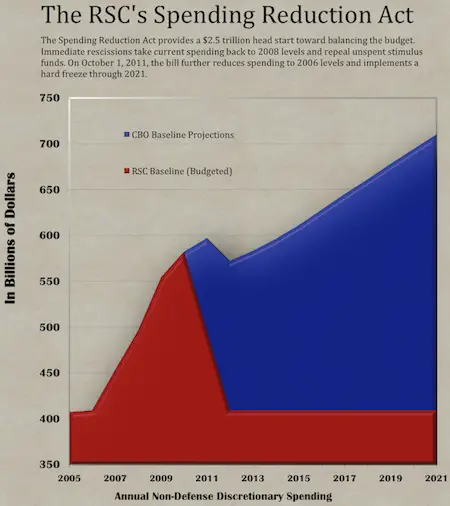The Republican Study Committee unveiled a plan today for reducing federal spending by $2.5 trillion over ten years. Dubbed the Spending Reduction Act of 2011, the recommendations would reduce non-security and non-defense discretionary spending and introduce more than 100 other program cuts.
You can read the summary of the act to see for yourself some of the suggestions it contains, but among the many proposed cuts are some that would, if enacted, have direct impact on federal employees. At the time of this writing, the full text of the act is not yet available. This summary comes directly from the Republican Study Committee; details on some of these proposed cuts are sketchy at this point, but we will keep readers abreast of the details as more become available. These include:
- Eliminate automatic pay increases for federal workers for five years. As readers already know, a two-year pay freeze was enacted by Congress which took effect at the start of 2011. This would presumably add three more years to that.
- Cut the civilian workforce by 15% through attrition. The recommendation would allow only one worker to be hired for every two that leave until the reduction target has been met.
- Eliminate all remaining unspent funds from the stimulus package ($45 billion total estimated savings)
- Require collection of unpaid taxes by federal employees – apparently there are a lot of federal employees who owe taxes as this is estimated to save about $1 billion.
- Prohibit taxpayer funded union activities by federal employees ($1.2 billion savings over 10 years)
- Sell excess federal properties which the government does not use ($15 billion savings)
- Trim the federal vehicle budget by 20% ($600 million annual savings)
The November 2010 elections created a dramatic power shift in the House, presumably because voters were upset about the increased government spending in the previous two years. The proposed cuts in the act are merely ideas at this point, but it is illustrative of the thinking of newly elected politicians as to how to put federal spending in check. It’s anybody’s guess as to whether these or other spending cuts might be enacted by Congress in the near future. We will continue to keep readers informed of new developments which would have a direct impact on the federal workforce.
About the Republican Study Committee
The Republican Study Committee is a group of over 165 House Republicans organized for the purpose of advancing a conservative social and economic agenda in the House of Representatives. The Republican Study Committee is dedicated to:
- A limited and Constitutional role for the federal government,
- A strong national defense,
- The protection of individual and property rights,
- And the preservation of traditional family values.


